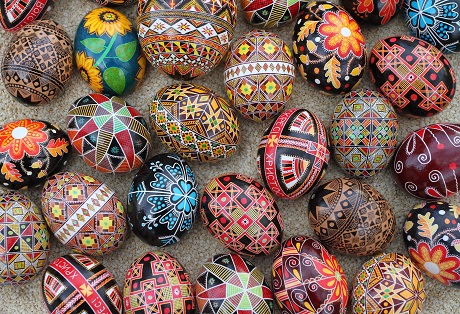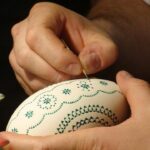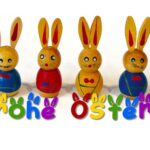Easter Eggs Traditions from Germany
It is really impossible to imagine Easter without such an attribute as colored eggs. This is a very old tradition dating back to the 16th century to exchange colored eggs as Easter presents. Later, it became a custom for young people who were in love with each other, to give the decorated eggs to their sweethearts.
People used complicated techniques to decorate the eggs. Eggs were gilded, lined with paper and adorned with inscriptions and ornaments. A popular method was to inscribe decorations and verses on the white eggs using liquid wax. Afterwards the eggs were dyed and the spots covered with wax remained and were clearly visible. This elaborate technique is still applied in a few Hessian villages. Nowadays the coloring techniques have become simplified: You can use natural or artificial dye-stuff to make the eggs look like bright toys. The most common household method is using onion-peel brew for eggs-coloring.
Beautifully colored eggs are a perfect Easter gift. Unlike the feudal-time tradition, when the different social classes had different rights and duties (in this case the right to receive the gift and the duty to give it), nowadays people exchange Easter presents to express the friendly attitude and affection. However nobody, and least of all children, is obligated to give presents at Easter. Kids only receive them. In some German regions, children virtually collect Easter eggs from their relatives, especially their godparents. In general, the customs relating to children’s gifts have also changed. What once were conventional little gifts, have now become more or less “surprise presents” brought by the Easter Bunny, as little children believe.
Children play games with Easter eggs: They try to outdo each other in rolling colored eggs down grassy slopes, or they knock the egg’s pointed ends together, and the child whose egg does not shatter gets the broken egg too. And the family would eat hard-boiled eggs for weeks afterwards!
After the long and severe 40-days fasting, people have Easter breakfast or Easter dinner. This is the time when all kinds of food are permitted – meat and milk, cheese and butter… and eggs! All festive tables are bright with multicolored hard-boiled eggs. This is a beautiful ancient Easter tradition, but the question arises: “What to do with all these eggs???”
Of course, you can just eat them. But how many eggs can you eat without getting sick and tired of them till the next Easter? I bet not many, and certainly far less than you prepare for the Easter feast. Instead, you can make the most of the egg-time and please your family and friends by making, for example, the egg-fruit salad:
Egg – Fruit Salad
Ingredients:
5 hard-boiled eggs
1 can of pineapples
2 bananas
2 apples
3-4 tbsp. mayonnaise
3-4 tbsp. cream
Cooking:
Make the salad sauce: blend mayonnaise, cream and some pineapple juice. Roughly chop the eggs, slice pineapples and bananas, cut the unpeeled apples into little cubes, and mix with the sauce. Serve cooled.
Related articles:
How Germany Celebrates Easter: Traditions That Are Older Than Christianity
The History of Easter in Germany: Pagan Roots & Christian Traditions
Easter Bunny Recipes
Easter Feast
How to celebrate Easter like a German
Easter Monday – Ostermontag








